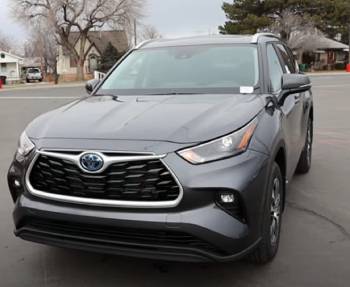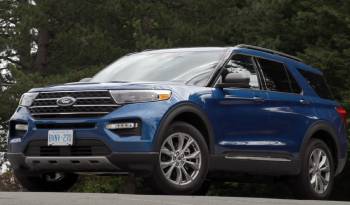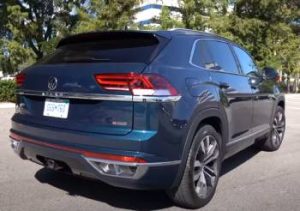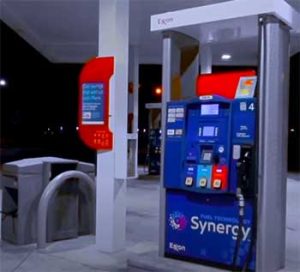When it comes to hybrids, especially in the SUV segment, there’s a lot of buzz surrounding two big names: the Toyota Highlander Hybrid and the Ford Explorer Hybrid. As consumers, we want the best bang for our buck.
Let’s dive deep into these two SUV powerhouses and see which one emerges at the top.
A Brief Comparison Table
| Feature | Highlander Hybrid | Explorer Hybrid |
| Engine | 2.5-liter 4-cylinder + electric | 3.3-liter V6 + electric |
| Transmission | CVT | 10-speed automatic |
| Fuel Efficiency (Combined) | ~30s MPG | ~Mid-20s MPG |
| Towing Capacity | Up to 3,500 pounds | Up to 5,000 pounds |
| Cargo Space | Moderately spacious | More expansive |
| Tech Features | Toyota Safety Sense, Apple CarPlay, Android Auto | SYNC system, Apple CarPlay, Android Auto |
| Price | Typically higher | Might offer better value |
Highlander Hybrid: The Good and the Not-So-Good

Pros of the Highlander Hybrid:
- Fuel Efficiency:
Toyota has always been a leader when it comes to creating efficient vehicles. The Highlander Hybrid, true to form, offers impressive miles-per-gallon figures, making it a top choice for those looking to save on fuel.
- Reliability:
The Toyota brand is synonymous with reliability, and the Highlander Hybrid is no exception. Owners can count on it to get them from point A to B without a hitch.
- Cabin Space & Comfort:
It boasts a spacious interior, with plenty of room for passengers and cargo. The seats are comfortable, and the ride quality is smooth, making long journeys a breeze.
Cons of the Highlander Hybrid:
- Price:
Given its impressive array of features and the Toyota badge, the Highlander Hybrid can be on the pricier side.
- Driving Dynamics:
For those looking for a sporty drive, the Highlander might not be the first choice. Its focus is more on comfort than spirited driving.
Also Read: Differences Between General Gmax AS-05 And Michelin Tires.
Explorer Hybrid: Here’s What Stands Out

Pros of the Explorer Hybrid:
- Power:
Ford is known for its powerful engines, and the Explorer Hybrid is no exception. It offers a more powerful drive compared to many hybrids in its class.
- Towing Capacity:
If you’re looking to haul a boat or trailer, the Explorer Hybrid might be your best bet. It offers a considerable towing capacity.
- Infotainment System:
With the SYNC system, the Explorer offers one of the best infotainment experiences in its class.
Cons of the Explorer Hybrid:
- Fuel Efficiency:
While it’s efficient for an SUV, it doesn’t quite match the fuel efficiency of the Highlander Hybrid.
- Initial Acceleration:
Despite having power, some users have reported that its initial acceleration feels a tad sluggish.
Key Differences Between the Highlander Hybrid and Explorer Hybrid
Hybrid technology in SUVs has brought about a revolution in the auto industry, offering users the best of both worlds – the space and luxury of an SUV combined with the efficiency of a hybrid engine.
The Toyota Highlander Hybrid and the Ford Explorer Hybrid are at the forefront of this movement. But how do they differ? Let’s take a closer look.
1. Powertrain & Performance
The Highlander Hybrid features a 2.5-liter 4-cylinder engine combined with electric motors. This configuration gives it a decent amount of power while focusing on maximum efficiency. The continuously variable automatic transmission (CVT) aids in a smoother ride and better fuel economy.
The Explorer Hybrid, on the other hand, boasts a 3.3-liter V6 engine coupled with an electric motor. This not only provides more power but, combined with its 10-speed automatic transmission, ensures the Explorer has a more traditional SUV feel in terms of performance.
2. Fuel Efficiency
Toyota’s focus has always been on maximizing fuel efficiency. The Highlander Hybrid, as of 2021, offers an impressive range in the 30s (MPG) for combined city/highway driving, depending on driving conditions and model specifications.
The Explorer Hybrid, while efficient for its power and size, usually finds itself in the mid-20s MPG for the same conditions. It’s worth noting that this might be a trade-off for its added power and towing capabilities.
3. Towing Capacity
For those who need a vehicle for heavier tasks, towing capacity becomes crucial. The Explorer Hybrid clearly takes the lead here with a capacity that can reach up to 5,000 pounds in some configurations.
The Highlander Hybrid, while competent, has a more modest towing capacity, generally maxing out around 3,500 pounds.
4. Interior Space & Comfort
Both vehicles offer spacious interiors suitable for family travel, but there are nuances. The Ford Explorer Hybrid typically has a more expansive cargo area, especially when the third-row seats are folded down.
The Highlander Hybrid, while spacious, may offer slightly less cargo space but often gets points for its plush seating and comfortable ride, especially in higher trim levels.
5. Tech & Features
Both vehicles come loaded with tech, but there are differences in how they present and package these features.
The Explorer Hybrid has Ford’s SYNC infotainment system, which is intuitive and user-friendly. It generally offers a larger touchscreen than the Highlander and provides features like Apple CarPlay, Android Auto, and Wi-Fi hotspot capabilities.
The Highlander Hybrid, on the other hand, also boasts Apple CarPlay and Android Auto but usually complements these with Toyota’s suite of advanced safety features, known as Toyota Safety Sense. This includes adaptive cruise control, lane departure warning, and more.
6. Price Point & Value
Toyota vehicles, given their reputation for reliability and longevity, often come with a premium price tag. The Highlander Hybrid is no exception, especially in its higher trims.
The Explorer Hybrid, while not exactly a budget vehicle, might offer a more attractive price-to-feature ratio for those who prioritize power, towing capacity, and a more SUV-like driving feel.
Also Read: Differences Between Discount And Costco Tires.
The FAQ Rundown
While both SUVs have their strengths, the Highlander excels in terms of fuel efficiency and reliability, whereas the Explorer stands out for its power and towing capacity.
The Ford Explorer generally offers a slightly larger body and more cargo space. However, the difference isn’t substantial, so the choice might come down to personal preference and use-case.
Absolutely! Toyota is well-known for its reliability, and the Highlander Hybrid is a testament to that legacy.
While specific figures can vary based on model year and driving conditions, as of my last update in 2021, the Explorer Hybrid hovers around the mid-20s MPG for combined city/highway driving. Always check the latest specs or real-world tests for the most current data.
In terms of size and functionality, the Toyota Highlander is often compared to the Ford Explorer. However, if we’re considering non-hybrid options and broader comparisons, the Toyota Sequoia might also come into the picture.
Toyota Highlanders, especially the hybrid variant, are popular due to their impressive fuel efficiency, reliability, spacious interiors, and the brand’s reputation for producing long-lasting vehicles.
Wrapping Up
Deciding between the Highlander Hybrid and Explorer Hybrid is like choosing between chocolate and vanilla – both are fantastic in their own right. If fuel efficiency and reliability top your list, the Highlander is your go-to. But, if power, towing capacity, and a stellar infotainment system sound appealing, the Explorer might just be calling your name.
While both vehicles are powerhouses in the hybrid SUV segment, your choice should reflect your priorities. If efficiency and Toyota’s reputation for reliability are top priorities, the Highlander Hybrid is hard to beat. If you want more power, towing capacity, and a slightly larger cargo area, the Explorer Hybrid beckons. Both are solid choices, promising a blend of performance, efficiency, and luxury.
Remember, the best choice is the one that fits your unique needs and desires. Whether you’re team Highlander or team Explorer, you’re in for a solid ride. Safe driving!



